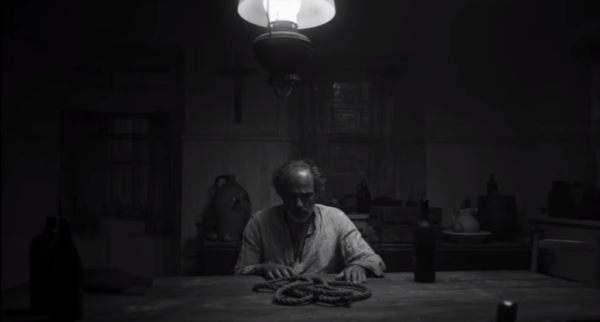The Little Girl Who Was Too Fond of Matches review

Screenshot from Youtube
The Little Girl Who Was Too Fond of Matches from director Simon Lavoie is a 2017 French-Canadian adaptation of the classic 1998 Québécois novel of the same name.
The story is the stuff of dark fairytale. Two children, a girl (Marine Johnson) and a boy (Antoine L’Écuyer), are raised in the isolation of their tyrannical father’s (Jean-François Casabonne) farmhouse, somewhere deep in the wilderness.
The father creates an insular world for his children and takes for himself the role of its God. Claiming to have sculpted them from clay and raising the both of them as sons, the father looms over the children with an invisible omnipotent authority. Outsiders are met with hostility, yet there is an evil festering within the house too — in forbidden rooms, in the shed that’s always locked, in what the father leaves unsaid.
The film opens with the father’s suicide, from which point we alternate between what came before and what comes after. In the moments leading up to his hanging, the children sit idly by, ignorant to the significance of the noose and interested only with the dregs of wine he leaves out on the table. But after the father is discovered hanging and dead, the magic seal on the children’s world is finally broken, and new freedoms, fears, and responsibilities come rushing in.
The siblings diverge at the foot of this new world. Whereas the boy only desires to keep living by the rules his father outlined, to take on his father’s role, eventually donning his ritual robes and toting a rifle as the new head of the family, the girl, who has all along sought the light — figuratively, in her reading of forbidden literature, and literally, in her intermittent pyromania — begins to descend by lamplight into the depths of her past. But as the film’s title suggests (and the girl will come to learn in the film’s brutal latter half), knowledge comes with a price.
Throughout the film, the characters remain unnamed. Place and time, too, are uncertain beyond some hazy early 20th century past. The inhabitants of the nearby village are reduced to a herd, headed by the their priest, whose eyes we never get a good look at, cropped out of frame in close up as an inhuman and inaccessible face of adult society.
This lends the film an old and allegorical kind of weight, without ever resolving itself clearly into some more order or crossing over completely into the fantastic.
Shot in black and white through the fisheye distortion of wide angles, the film at times evokes the gothic or expressionistic, especially with a number of interior shots lit by lantern or candles alone. At other times, though, Matches takes on an observational realism. The camera tracks its subjects with intimate long takes that keep them close in centre frame, at once following the character through the environment and the environment through the character. With the exception of the theatrically trained Jean-François Casabonne, who gives the father a manic and larger-than-life aspect, the acting is understated and naturalistic, making the film’s uncanny horrors all the more shocking in reflection.
The Little Girl Who Was Too Fond of Matches is not a film for the faint of heart. But while some may find it an exercise in misery with little in the way of redemption, for others it may capture something sublime in a suffering timeless and universal. For fans of atmospheric horrors like 2015’s The Witch or 2013’s A Field in England, or those simply interested in the darker offerings of Canadian cinema this year, watch for The Little Girl Who Was Too Fond of Matches at your local arthouse theatre or on digital download.
The Little Girl Who Was Too Fond of Matches is available for purchase through iTunes today.






